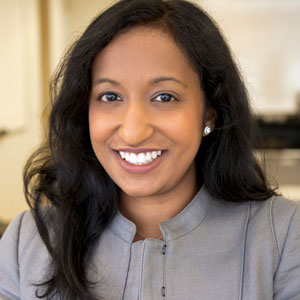Employers and Universities: Work with us?

60 Second Interview: Management consultant
Shirani began helping companies make improvements after realising her career as a doctor wasn't taking her where she wanted to go. She loves thinking creatively to tackle problems, meeting exciting new people and the fact that no two days are the same.
In today's interview, Shirani tells us a bit more about what she does and explains how you can follow in her footsteps.

Name: Dr Shirani Rajapaksa
Company: Attain
Industry: Medical & Healthcare
What is your job? Management consultant (associate director)
How long have you been doing this job? Since 2015, after changing careers in 2009
Education
University: University of Bristol
Degree Subject: Medicine and pharmacology
List A-Levels: Biology, chemistry, maths, music
1. What was your very first job?
Honestly, busking with the violin in the city centre over summer holidays!
2. What did you want to do when you were at school?
Some sort of performer: ballerina, musician, singer…
3. Tell us a little bit about your job
In very basic terms, management consultants are usually hired for business advice by clients. This could range from helping clients solve problems like, “How do I grow my business?” to “Why am I losing customers?”. We then look at both internal and external factors and come up with not only likely reasons, but also provide ideas and solutions for how to tackle the issues. For me in healthcare, common projects are usually about answering a question like “How do I improve quality and patient experience for my service while being efficient and cost-effective?"
4. How did you find out about the industry?
I heard about it when I went to careers conferences and then networked with people in the job plus doing my own research online.
5. How did you get there?
It’s been a winding road! I started as a doctor and even went as far as specialising. But I realised I wanted more for my life and career and needed a change. The hard part was deciding where next. By doing research, rethinking my career path (with support of a career coach) and chatting to those in consulting, I realised that I already had the transferable skills to move into the industry without further training.
6. What is a typical day like?
A day in the office, starts with a tube commute into central London. Then I usually start with checking my inbox and prioritising tasks for the day. It also involves me connecting with my team that I oversee (either via phone, Skype or email) and with the project team I’m leading on client work. There are usually a series of meetings and calls dotted throughout the day. Tasks can range from writing reports, doing presentations and making business plans.
If I’m on the road, then it could be an early start to drive or take the train to my client’s office. I’m usually presenting my findings to the client on their site to support them, or facilitating senior meetings to provide my expertise and advice to help them solve their problems. As I work in the health sector, client sites can include hospitals and GP practices, so I get to see how they vary up close and personal.
7. What’s the best thing about your job?
The variety – very few days are alike, especially with the chance to travel. Having worked for global companies before, it was always cool to enjoy the perks and travel to parts of the world I would never have dreamed of visiting!
The various people I get to work with – either a great team or interesting clients - can be not only lots of fun, but also provide good learning opportunities.
8. What is the most challenging thing about your job?
Maintaining work-life balance. Although I am in charge of my calendar, if I don’t stay on top of having activities and events outside of the daily grind, I may find myself swamped with work deadlines.
9. What advice do you have for people who want to do what you do?
If you’re set on a career in management consulting, then really work on your communication, writing and numeracy skills. These will be tested in a series of interviews per job. Good consultants bring energy to their work and lots of ideas – we tend to be wired to always look at how things could be improved, so a forward thinker is a preferred type. I recommend work experience at a firm to get a grasp of how things are done and what the culture is like (large firms tend to be more corporate compared to smaller ones that feel more like an extended family).
10. What things do you wish you’d known before starting your career?
The main thing is don’t worry if you haven’t got it all figured out yet. Don’t feel like you have to jump into a single profession for the rest of your life – the career world isn’t like that anymore! Career changes can happen at any stage in your life and I recommend you to welcome them with open arms. I’ve opened more doors to my life and work, as a result of being brave enough to try something new. Think about the skills and learning experiences you want to gain, and go for something that gives you the right opportunities for now but also the stepping stones to future ones.
10. Where would you like to be in 5 years?
In total, I’ve spent six years being a doctor and eight years being a consultant. So now it’s time to work on being more creative – in business, writing and music. Who knows, maybe in five years I will have impacted more on a socio-political level and have written a musical!
If you like the sound of life as a consultant, check our our Consultancy Career Zone or read up on how to become a consultant.
Image credits
Lead image via Freepik
